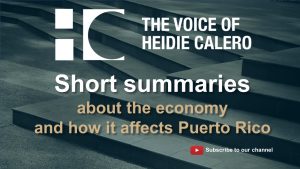
March 2015: Oil & PR Liquidity: A Dangerous Strategy
The Government’s delicate financial position has deteriorated significantly since January 2015. Delays in approving a tax increase on oil imports—against which the PR Highway and Transportation Authority (PRHTA) would issue bonds to service its debt with the Government Development Bank (GDB)—have led to onerous terms for the Commonwealth. Furthermore, the storm set-off by the proposed tax reform, unrelated to the tax hike on oil-related products, has increased uncertainty across the board and possibly tilted the Island’s fragile socioeconomic balance in the wrong direction. Unfortunately, the problem is even more delicate. Recent revisions to employment data meant that economic activity has been even slower than initially thought, perhaps resulting in yet another contraction in GNP. Inflation entered negative territory with the General Fund having at one point only $10 million in its coffers. This issue analyzes the economic and financial risks this is creating.







